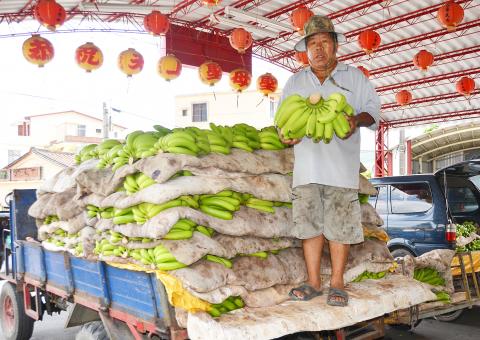The Council of Agriculture has touted plans to sell 2,000 tonnes of bananas to help farmers deal with a fruit glut, but with Taiwanese bananas selling below costs in China, academics are questioning whether politics is involved in the deal.
A report by China’s China News Agency said that the first 100 tonnes of Taiwanese bananas went on sale on Monday last week in Shanghai for 1.88 yuan (US$0.29) per 500g, or about NT$16.88 per kilogram.
However, the wholesale price for bananas at the end of last month was NT$20.50 per kilo at traditional markets in Taipei, averaging NT$17.70 for the whole month, and was NT$17.20 last week.

Photo: Yeh Yung-chien, Taipei Times
Taiwanese Farmers’ Rights Association chairman Wu Chiu-ku (吳秋榖) said retail prices were usually between NT$2 and NT$5 higher than the wholesale price, meaning that people in Taiwan purchased bananas at between NT$19 and NT$22 per kilo.
Once overhead such as transportation and customs taxes are factored in, the price of Taiwanese bananas in China should be higher, Wu said.
“How can Taiwanese bananas sell [for] cheaper on the Chinese market than in Taiwan?” Wu asked, adding that there was “something fishy” about the matter.
Wu Ming-ming (吳明敏), a professor in Kainan University’s marketing department, said the CIF — cost, insurance and freight — for a 12kg crate of Taiwanese bananas in China was US$9.50, or about NT$23 per kilo.
CIF means the seller is responsible for paying for costs associated with the delivery of the goods to the port of destination, as well as the purchase of insurance in the name of the buyer to cover potential risk of loss or damage to the goods during transport.
Adding a 5 percent tax, a 17 percent value-added tax (VAT) and 20 percent in management and marketing fees, every kilo should sell in China for NT$33.50 to meet overhead costs, Wu Ming-ming said.
It is unreasonable for bananas to be selling in Shanghai for less than half the overhead costs, Wu Ming-ming said.
Lee Yuan-ho (李元和), head of Fo Guang University’s economics department, said “zero distance” pricing and overhead showed that this was not normal trading practice, adding that as businesspeople would never invest to lose money, the government should explain who was covering the difference.
Market sources say that bananas shipped to China are being bought for between NT$10 and NT$12 per kilo, about the same price as those sold domestically.
The sources said that after packaging, transportation and handling fees were added, the CIF cost in China should be no less than NT$23 per kilo.
Hsiao Tung-chung (蕭柊瓊), deputy director-general of the Council of Agriculture’s International Cooperation Division, said the Taiwanese bananas sold in Shanghai last week were a commercial transaction between businesses based in Pingtung and Shanghai Fruit Co.
Translated by Jake Chung, Staff Writer

Alain Robert, known as the "French Spider-Man," praised Alex Honnold as exceptionally well-prepared after the US climber completed a free solo ascent of Taipei 101 yesterday. Robert said Honnold's ascent of the 508m-tall skyscraper in just more than one-and-a-half hours without using safety ropes or equipment was a remarkable achievement. "This is my life," he said in an interview conducted in French, adding that he liked the feeling of being "on the edge of danger." The 63-year-old Frenchman climbed Taipei 101 using ropes in December 2004, taking about four hours to reach the top. On a one-to-10 scale of difficulty, Robert said Taipei 101

Nipah virus infection is to be officially listed as a category 5 notifiable infectious disease in Taiwan in March, while clinical treatment guidelines are being formulated, the Centers for Disease Control (CDC) said yesterday. With Nipah infections being reported in other countries and considering its relatively high fatality rate, the centers on Jan. 16 announced that it would be listed as a notifiable infectious disease to bolster the nation’s systematic early warning system and increase public awareness, the CDC said. Bangladesh reported four fatal cases last year in separate districts, with three linked to raw date palm sap consumption, CDC Epidemic Intelligence

Taiwanese and US defense groups are collaborating to introduce deployable, semi-autonomous manufacturing systems for drones and components in a boost to the nation’s supply chain resilience. Taiwan’s G-Tech Optroelectronics Corp subsidiary GTOC and the US’ Aerkomm Inc on Friday announced an agreement with fellow US-based Firestorm Lab to adopt the latter’s xCell, a technology featuring 3D printers fitted in 6.1m container units. The systems enable aerial platforms and parts to be produced in high volumes from dispersed nodes capable of rapid redeployment, to minimize the risk of enemy strikes and to meet field requirements, they said. Firestorm chief technology officer Ian Muceus said

MORE FALL: An investigation into one of Xi’s key cronies, part of a broader ‘anti-corruption’ drive, indicates that he might have a deep distrust in the military, an expert said China’s latest military purge underscores systemic risks in its shift from collective leadership to sole rule under Chinese President Xi Jinping (習近平), and could disrupt its chain of command and military capabilities, a national security official said yesterday. If decisionmaking within the Chinese Communist Party has become “irrational” under one-man rule, the Taiwan Strait and the regional situation must be approached with extreme caution, given unforeseen risks, they added. The anonymous official made the remarks as China’s Central Military Commission Vice Chairman Zhang Youxia (張又俠) and Joint Staff Department Chief of Staff Liu Zhenli (劉振立) were reportedly being investigated for suspected “serious